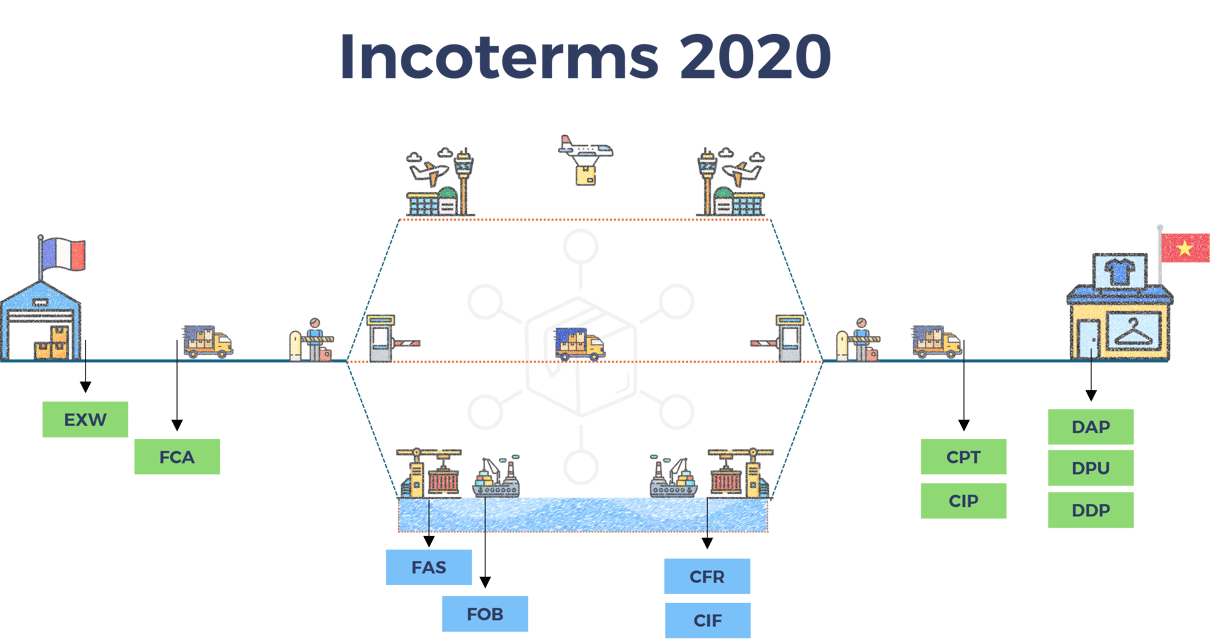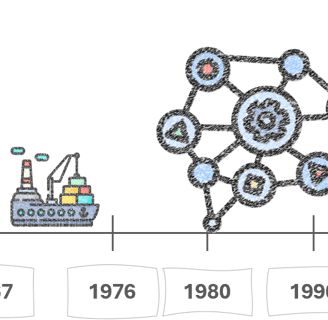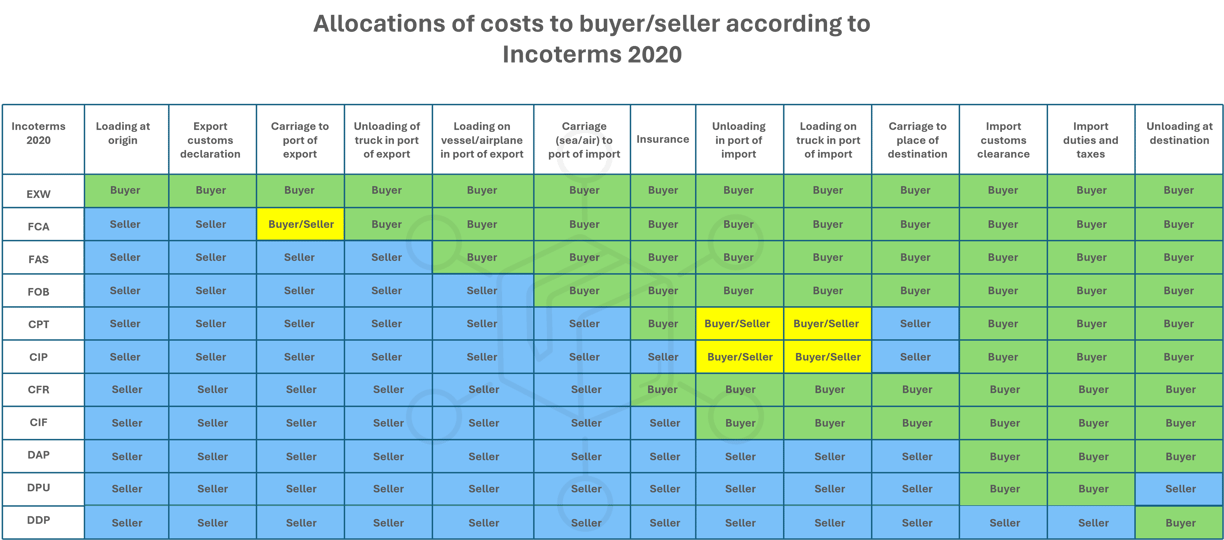Exploring Incoterms: A Simple Guide for Beginners in International Trade
101 GUIDE: EVERYTHING YOU NEED TO KNOW


Have you ever heard of terms like FOB, CIF, or EXW in discussions about international trade?
Introduction to Incoterms
Incoterms are short for "International Commercial Terms", developed by the International Chamber of Commerce (ICC) to clarify the responsibilities of buyers and sellers in international transactions. Since its first appearance in 1936, Incoterms have become an indispensable part of commercial contracts.
Since their introduction in 1936, Incoterms have undergone several significant updates to reflect changes in the international trade environment. Highlights include the establishment of terms in 1953, 1967, 1976, and subsequent decades, with major improvements in 1980, 1990, 2000, and 2010, culminating in the latest 2020 update. Each revision aims to clarify the obligations and responsibilities of exporters and importers, thereby facilitating smoother transactions and promoting mutual understanding among global partners. Incoterms not only simplify transactions but also create a common commercial language for all parties involved.


If so, you've encountered Incoterms. Incoterms are an essential part of the international trade landscape, but they can sometimes be confusing for newcomers.


Let's Explore Incoterms 2020:
Unraveling 11 Key Terms Together
Welcome aboard! In this journey, we'll embark on a voyage through the intricacies of Incoterms 2020. Together, we'll unravel the mysteries behind 11 key terms that shape international trade. Join us as we navigate through the complexities and discover the practical implications of each term. However, it's important to note that the analyses below will serve as concise summaries, making it easier for readers to grasp the key concepts. Are you ready? Let's dive in!
Rules for any mode of transport
Rules for sea and
inland waterways transport
EXW - Ex Works (named place of delivery)
FCA - Free Carrier (named place of delivery)
CPT - Carriage Paid To (named place of destination)
CIP - Carriage and Insurance Paid to (named place of destination)
DPU - Delivered At Place Unloaded (named place of destination)
DAP - Delivered At Place (named place of destination)
DDP - Delivered Duty Paid (named place of destination)
FAS - Free Alongside Ship (named port of shipment)
FOB - Free on Board (named port of shipment)
CFR - Cost and Freight (named port of destination)
CIF - Cost, Insurance & Freight (named port of destination)
EXW - Ex Works (named place of delivery)
EXW (Ex-works) means the seller makes the goods available at their location, and the buyer handles all transportation and associated costs. The EXW term is often used while making an initial quotation for the sale of goods without any costs included.
FCA - Free Carrier (named place of delivery)
FCA (Free Carrier) is a shipping term where the seller delivers the goods at a specified location, cleared for export. The buyer can nominate a carrier or a receiving party. If delivery happens at the seller's location, they're responsible for loading onto the buyer's carrier. Otherwise, the buyer takes responsibility for unloading and loading onto their own carrier when delivery occurs elsewhere.
CPT - Carriage Paid To (named place of destination)
CPT (Carriage Paid To) replaces C&F and CFR for all modes of transport except non-containerized sea freight. The seller pays for shipping the goods to the named destination. Risk transfers to the buyer upon delivery to the carrier. The seller covers origin costs and transportation to the destination
CIP - Carriage and Insurance Paid to (named place of destination)
CIP (Carriage and Insurance Paid to) is similar to CPT, but the seller is also responsible for obtaining insurance for the goods during transit. The seller must insure the goods for 110% of the contract value, using specific insurance clauses. This term applies to all modes of transport, unlike CIF, which is limited to non-containerized sea freight.
DPU - Delivered At Place Unloaded (named place of destination)
DPU (Delivered At Place Unloaded) requires the seller to deliver the goods, unloaded, at the specified destination. The seller covers all transport costs and risks until the goods reach the destination port or terminal. The terminal can be a port, airport, or inland freight interchange. Any charges after unloading are the buyer's responsibility. However, the seller usually bears the cost of terminal delay or demurrage. There's some ambiguity regarding 'unloaded' when goods are delivered in a container, especially by sea.
DAP - Delivered At Place (named place of destination)
DAP (Delivered At Place) means the seller delivers the goods to the buyer at the named destination. The seller is responsible for all costs and risks until the goods are ready for unloading at the destination. The seller handles packing and export formalities, while the buyer manages import customs clearance and any associated duties and taxes. Carriage expenses are covered by the seller up to the destination, with unloading costs borne by the buyer.
DDP - Delivered Duty Paid (named place of destination)
DDP (Delivered Duty Paid) means the seller delivers the goods to the buyer's named place in their country and covers all costs, including import duties and taxes. The seller is not responsible for unloading. This term is equivalent to 'Free In Store (FIS)' and places maximum obligations on the seller and minimum obligations on the buyer. The seller handles customs clearance in the buyer's country, including duties, taxes, and necessary authorizations. However, DDP can pose risks and extra costs if regulations in the buyer's country are not well understood.
FAS - Free Alongside Ship (named port of shipment)
FAS (Free Alongside Ship) means the seller delivers the goods alongside the buyer's vessel at the named port of shipment. The buyer bears all costs and risks from that moment. The seller is responsible for clearing the goods for export unless otherwise specified. FAS is only used for non-containerized sea freight and inland waterway transport
FOB - Free on Board (named port of shipment)
FOB (Free on Board) means the seller is responsible for all costs and risks until the goods are loaded onto the vessel. However, the seller's responsibility continues until the goods are clearly identified as part of the contract. The seller arranges for export clearance and delivers the goods to the buyer's designated vessel. The buyer covers marine freight, bill of lading fees, insurance, unloading, and transportation costs from the arrival port to the destination. FOB should only be used for non-containerized sea freight and inland waterway transport.
CFR - Cost and Freight (named port of destination)
CFR (Cost and Freight) means the seller pays for transporting the goods to the named destination port. Risk transfers to the buyer once the goods are loaded onto the ship in the exporting country. The seller covers origin costs, including export clearance and freight to the named port. However, they're not responsible for delivery to the final destination or buying insurance. If the buyer wants insurance, they should consider CIF instead. CFR is only used for non-containerized sea freight and inland waterway transport; for other modes of transport, it's replaced with CPT.
CIF - Cost, Insurance & Freight (named port of destination)
CIF (Cost, Insurance & Freight) is an Incoterm similar to CFR, but with the seller required to obtain insurance for the goods during transit. The seller must insure the goods for 110% of the contract value under specific clauses unless otherwise agreed. The seller also provides necessary documents to the buyer to obtain the goods and assert claims against insurers. These documents include the invoice, insurance policy, and bill of lading. Seller's obligations end upon handing over these documents to the buyer, who then pays at the agreed price. CIF is suitable only for non-containerized sea freight; for other transport modes, CIP should be used instead.



